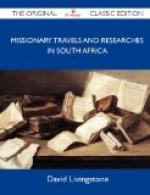and I, with about forty young men, waited outside
the tsetse till dark. We then went forward, and
about ten o’clock it became so pitchy dark that
both horses and men were completely blinded. The
lightning spread over the sky, forming eight or ten
branches at a time, in shape exactly like those of
a tree. This, with great volumes of sheet-lightning,
enabled us at times to see the whole country.
The intervals between the flashes were so densely
dark as to convey the idea of stone-blindness.
The horses trembled, cried out, and turned round,
as if searching for each other, and every new flash
revealed the men taking different directions, laughing,
and stumbling against each other. The thunder
was of that tremendously loud kind only to be heard
in tropical countries, and which friends from India
have assured me is louder in Africa than any they
have ever heard elsewhere. Then came a pelting
rain, which completed our confusion. After the
intense heat of the day, we soon felt miserably cold,
and turned aside to a fire we saw in the distance.
This had been made by some people on their march;
for this path is seldom without numbers of strangers
passing to and from the capital. My clothing having
gone on, I lay down on the cold ground, expecting to
spend a miserable night; but Sekeletu kindly covered
me with his own blanket, and lay uncovered himself.
I was much affected by this act of genuine kindness.
If such men must perish by the advance of civilization,
as certain races of animals do before others, it is
a pity. God grant that ere this time comes they
may receive that Gospel which is a solace for the soul
in death!
While at Sesheke, Sekeletu supplied me with twelve
oxen—three of which were accustomed to
being ridden upon—hoes, and beads to purchase
a canoe when we should strike the Leeambye beyond
the falls. He likewise presented abundance of
good fresh butter and honey, and did every thing in
his power to make me comfortable for the journey.
I was entirely dependent on his generosity, for the
goods I originally brought from the Cape were all
expended by the time I set off from Linyanti to the
west coast. I there drew 70 Pounds of my salary,
paid my men with it, and purchased goods for the return
journey to Linyanti. These being now all expended,
the Makololo again fitted me out, and sent me on to
the east coast. I was thus dependent on their
bounty, and that of other Africans, for the means
of going from Linyanti to Loanda, and again from Linyanti
to the east coast, and I feel deeply grateful to them.
Coin would have been of no benefit, for gold and silver
are quite unknown. We were here joined by Moriantsane,
uncle of Sekeletu and head man of Sesheke, and, entering
canoes on the 13th, some sailed down the river to the
confluence of the Chobe, while others drove the cattle
along the banks, spending one night at Mparia, the
island at the confluence of the Chobe, which is composed
of trap, having crystals of quartz in it coated with




